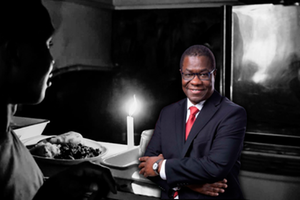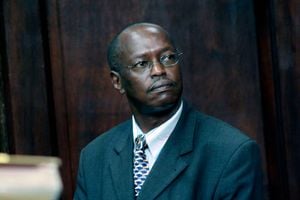More Darfuris flee, begging for UN help

Jan Eliasson, UN Special Envoy for Darfur, speaks outside the Security Council chambers, at the United Nations, in New York on Tuesday.
Four years after the Darfur conflict erupted, new refugees continue to pour into growing makeshift camps telling of murder, pillage and rape.

Jan Eliasson, UN Special Envoy for Darfur, speaks outside the Security Council chambers, at the United Nations, in New York on Tuesday. Photo/REUTERS
In Ardamata in West Darfur, thousands have only torn plastic sheeting propped up by sticks as shelter from dust and searing sun, after militia attacks drove them from their homes.
Tired aid workers battle on in the world’s largest humanitarian operation to provide food and healthcare to those who are fleeing attacks on their villages and on the roads.
Those who have suffered for years are also tired of waiting for UN forces. An African Union force mandated to protect civilians, they say, does nothing to help and its troops are usually too scared themselves to leave their camp.
“The only way to solve this problem is for the United Nations to come here to protect us,” said Abdallah Hamad, whose village was attacked in December, forcing him to seek a haven in Ardamata, near the State capital el-Geneina.
He said the AU troops were incapable of fighting the militia, known as Janjaweed.
“The African Union (troops) are useless. They themselves need UN protection,” he said. He added that when armed militia entered the camp a few days earlier, the AU troops fled.
Ill-equipped and underfunded, the AU force often comes under attack itself. This week two AU soldiers were killed in South Darfur.
President Omar Hassan al-Bashir refuses to accept large numbers of UN troops in Darfur, calling such proposals an attempt to colonise the country. Observers say he really fears those troops will arrest officials likely to be indicted by the International Criminal Court for alleged war crimes.
Ardamata, four years old, houses more than 20,000 people. The Darfur violence, described as genocide by Washington in a term Khartoum rejects, has driven 2.5 million from their homes and killed an estimated 200,000.
Khartoum says those numbers are exaggerated and accuses the Western media of blowing the conflict out of proportion. A May 2006 peace deal has been largely ignored and a new rebel alliance rejected the accord and renewed hostilities with the government soon after.
The stories from those newly arriving at Ardamata are the same painful testimonies heard all over Darfur in hundreds of camps in all the region’s three States over the past four years.
“The Janjaweed came on horses, shot two men, hit another old woman in the chest and looted many houses,” said Asil Ibrahim from Deleiba village in West Darfur.
“They were shouting ‘you are blacks, you are tora bora (rebels)’, and threatening people with their guns.”
Mariam Ishaq Adam, 80, was too weak to rise from her bed while armed militia looted her house and beat her daughters in front of her. It took her 10 days to walk to Ardamata camp, drinking dirty water on the road.
While Darfuris suffer, politicians in Khartoum, at UN headquarters in New York and at AU headquarters in Addis Ababa talk. Delegation after delegation is sent, and statement after statement written.




